|
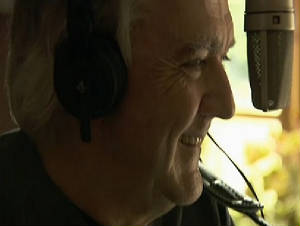
|
| Johnny McEvoy |
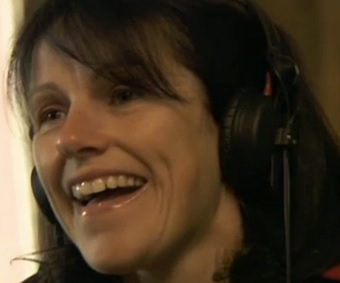
|
| Sharon Shannon - Session Musician On Murshin Durkin |
|
Within weeks of Murshin Durkin being released it went to No.1 in the charts bringing fame and fortune to Johnny McEvoy.
[Johnny] My life changed over night, I was floating on air, I was riding high. Hit followed hit and Johnny became a regular
fixture in the Irish charts, with songs like Those Brown Eyes, for the next 10 years. Johnny was an icon, as big as The Beatles,
the girls loved him. He was the hero we were all waiting for at that time. But being in the lime light was not all Johnny
McEvoy thought it to be. Johnny] I did not know how to handle this, instead of me enjoying this, it became a burden.
What he did not know then was that an illness that was buried in his family history would take hold of his life with devastating
consequences His grandfather died in a mental hospital, there was no medication or no treatment. [Johnny] I never knew my
grand father, I felt I knew him, and I feel I knew part of him that nobody else knew. Johnny McEvoy was born in Banagher on
the banks of the river Shannon, Co. Offaly. He was one of 4 children born to Emily and Jack McEvoy. Johnny was born in on
the last few days of the second world war, it was a small, dark dismal house. There was no running water, no bathroom, no
inside toilet
|
|
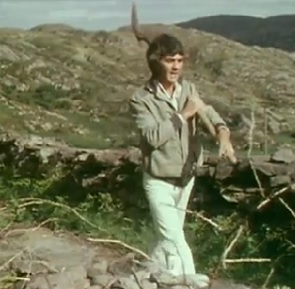
|
| Johnny McEvoy Murshin Durkin |
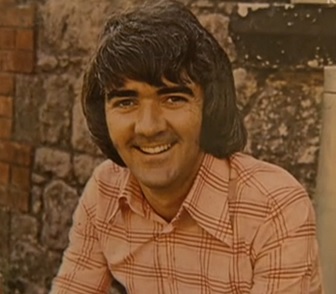
|
| Johnny In 1966 |
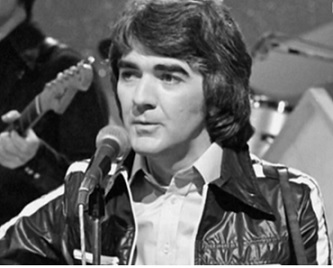
|
| Johnny With Band |
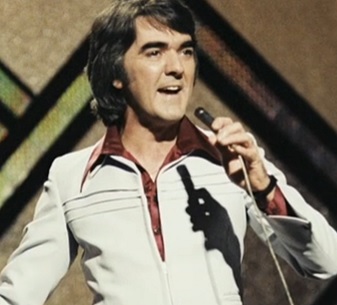
|
| Johnny McEvoy On The Big Stage |
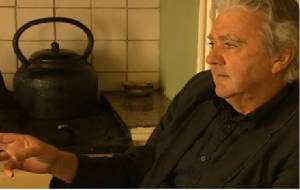
|
| Johnny In Banagher |
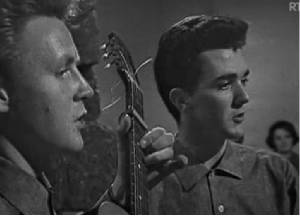
|
| The Ramblers |
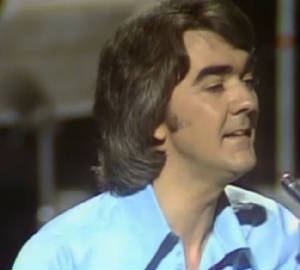
|
| Johnny Singing Murshin Durkin |
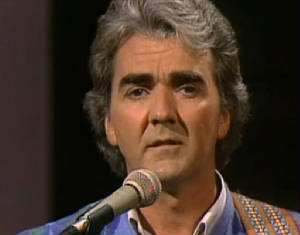
|
| Johnny Singing The Ballad Of John Williams |
|
Johnny's father didn't live in the house for the most part as he was off working in Dublin. The first 6 years of Johnny's
life he never knew his father who worked as a bus driver. Sometimes his father would drive the Birr to Banagher bus
where he would bring the bus home with him. He'd park the bus outside the house and go inside for a cup of tea, it could be
weeks before Johnny's father would return. The McEvoy family moved to Dublin when Johnny was 6 years old, but Johnny
would always return to Banagher on summer holidays and stay with his relations. He would stay with his uncle Dan for eight
weeks of the summer, Johnny says these were the happiest days of his life.
The highlight of those long summer months were the concerts Johnny and his friends would put on in a barn at the back of
the house. Someone would play the mouth organ and Johnny would sing. All the songs were from Ireland's Own. Songs like The
Rising Of The Moon and I Love To Go Wandering, The Dawning Of The Day was played on the tin whistle. The singing would go
on all evening and could be heard 3 miles away. The happiness Johnny felt on stage in the old barn stayed with him long after
he left school and while still in his teens he started singing in local pubs. He had found work in an advertising company
and found that it wasn't for him.
Johnny soon left his job. He told his mother in the kitchen the same day that he had
left work and wanted to be a singer. His mother said, Ah Sure I'll Always Stand By You, but don't tell your father.
Johnny and his friend Mick Crotty got together and formed The Ramblers Two. It wasn't long before they were getting some
high profile booking. [Johnny] One thing we had was ''Neck'' , we had great courage and belief in ourselves. We played with
The Rolling Stones in The Adelpha Cinema. It was the most frighting experience of my professional life. The place was packed
with people all screaming for Mick Jagger, what I didn't realise then that within two years they would be all screaming for
me. Johnny decided to start out as a solo singer, the 60's was a time of great freedom. People were listing, really listing
to the songs. Behind the public performance Johnny was quiet a shy person and within months of going solo Johnny went from
folk singer to a house hold name in Ireland. It was a song that his mother heard him singing in his bedroom that became a
No. 1 hit, he was only 20 years old when he released Murshin Durkin. Suddenly he went from 50 people a night watching him
to 1500 a night. One night Johnny was a simple ballad singer like many more who played the pubs and clubs around Dublin and
the next night he was a pop star. There were girls tearing at his clothes trying to get to him, it was so loud that nobody
could even hear him singing.
Johnny was now famous getting tons of fan mail, the phone never stopped ringing. He couldn't walk down the street because
he was being chased around the streets by fans. The ''B Side'' of Murshin Durkin which was Those Brown Eyes went to No. 1
in the charts selling 50,000 copies. Johnny McEvoy was selling more records in Ireland that The Beatles or The Rolling Stones.
It was at this time Johnny met the women who would become his wife, she was working as a Hair Dresser in Harcourt Street Dublin.
[Johnny] Boston Burglar had just went to No. 1 in the charts, I walked in and just took a fancy to her. At first she
wouldn't go out with him but eventually did. They soon got married and have been together for over 40 years. There
was little time for a honeymoon with Johnny playing concerts almost every night of the week. But he was doing what he loved
most, singing the songs he believed in. Johnny would always give a bit of a history to his songs before singing them on stage.
He's give the background info. for every song just like most of the bards and balladeers. This would add value to his songs.
Johnny has always regarded himself more of a story teller than a singer. Ireland's troubled history held
a deep fascination for Johnny McEvoy. Songs of emigration, famine and rebellion were at the heart of his music. His great,
great, great grand father was born around the time of the famine. That's only three generations back. Johnny says-I don't
think we should forget the famine, but we should not dwell on it either, I survived the famine, a million did not, 2 million
had to go away, we are still here so we are the survivors. The emotional energy behind Johnny's songs of
heartache, love and struggle captured something of the turmoil of the man himself. Unknown to his fans there was a man struggling
to come to terms with the pressures of his own fame. At a certain stage it was no longer the craic, the fun, the freedom.
The depression then started to kick in. He started to drink - The depression hit him a wallop. One night he was staying with
a friend in a flat in London. His friend made up a bed on the floor, Johnny remembers laying on the bed looking up, he started
to shake, he felt all these things crawling all over him and became absolutely terrified , he thought he was hallucinating
and thought ''I'm Cracking Up Here''. When you go to the debts of depression your so weak, you can't get out of bed, you don't
shave, don't talk, just don't function, but for most of the time you cry. Johnny tried to hide the utter despair from people.
Johnny
was in a hotel one night having a drink with friends, suddenly his head fell down and smacked off the table, driving home
that night he stopped the car and had a good think, he cried for half an hour saying to himself, ''This Has To Stop'' , he
was in complete despair. He hasn't took a drink since that night, that was over 30 years ago. To this day he still suffers
with depression, but has learned to live with it.
Back in the 70's Johnny formed a band, it was the thing to do at the tome to fit in. But it was a move he would become
to regret. There were times Johnny felt he wished he was back in the Abbey Tavern, just sitting on a high stool and just singing
what I really loved to sing. The band stopped him in his tracks, it stopped him doing what he done naturally, being in a band
wasn't really for him. It was the music promoters and ballroom managers who controlled the music scene. The only place anybody
could really work was in the dance halls and thats where he went wrong. As Johnny Said, ''It Was Madness, Just Madness''
. He spent years on the road away from his family. He was never there for week ends, Easter, St. Patrick's Day, Birthday's,
He was gone all the time-Never seen his children or wife.
These days Johnny has gone back to writing his own songs,
the songs are more of a personal nature. Shay Healy recons Johnny is singing better now that when he was a ''Pin Up'' , it's
just Johnny and his music, he's apProAching what Shay calls the Leonard Cohen stage of his career where he can speak to people
his own age and express the emotions of someone his own age, Shay goes on to say, he's becoming great interpreter and writer
of his own songs.
[Johnny] I was writing some great songs during the bleak times, the songs were great but they
didn't suit where I was working. But now I feel I now have all that freedom that I lost over the years. Some people
just want to play golf, I have no intention of playing golf, I don't even like golf, I want to write songs.
Johnny
continues to preform in a select few venues at home and abroad. For those who love what he brought to his performances, his
shows continue to strike a chord. He has never lost his keen interest in folk music. The name Johnny McEvoy will be enshrined
in folk music long after we are all gone.
 Shay Healy Talks To Johnny - Around 1968
Who is Johnny McEvoy ?
I recon he's one of the luckiest
guys in the vcountry. I got a break and suddenly everything was happening to me.
Is there a trace
of false modesty in this ? No obviously I have something that the public like, now I'm capitalising
on it. How do yo stand now as a performer ? It was once said that Johnny McEvoy's real name
was Liam Zimmerman [ Zimmerman was Bob Dylan's Real Name and the Liam referred to Liam Clanct ]. Do
they still say that ? Well lets face it, you sing a lot of the songs that Liam Clanct sings, songs
like Bodenstown Churchyard and Carrickfergus in much the same style.
I never heard Liam Clancy singing those
songs before I started to sing them. Anyway there not Liam Clancy's songs, and don't give
me anything about swapping songs. It's like schoolboys swapping comics and then you record a song and
someone says ''He Robbed Me Song On Me''.
I can sing a traditional song as good as any of them and
I don't need to apologise to anybody.
The last time I intervied you, you were fairly strong against
traditional singers.
Not against them, but I don't go for the phony finger in the ear bit. I like traditional
music but the approach to the general public is all wrong.
What happened to Bob Dylan ? I used to sing
a lot of Dylan stuff but I found it wasn't gong well in the dance halls, so I dropped most of it, I
still like Dylan.
I'm glad now that we're on to the dancehalls, do you like singing in them ? No
I hate it, I've been around them now for a year and I still hate them. It's all wrong, a lot of people
in charge are to blame. You arrive to find places not properly lit, the microphones are bad, the seating
arrangements are even worse and the whole thing is so unprofessional.
How much emphasis do you put on professionlism
? That's a naive sort of question. It means everything. That's the only thing lacking on the folk scene,
though in fairness with the exception of a few, the showbands are even more unprofessional.
Well
Funnyman was your first departure from Muirsheen Durkin / Boston Burglar image, have you the confidence
to try something like that again ?
I want to but I'll have to wait and see, I never want to do Mursheen
Durkin again.
Well there he is, mixed up or fairly on the ball. All his major concerts have been large
personal trumphs. All his records are selling and he knows what he wants to do.[ Interview In
1968 ]
|

